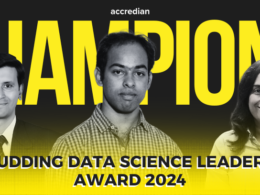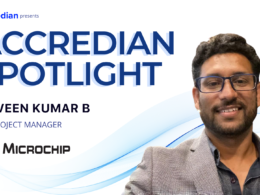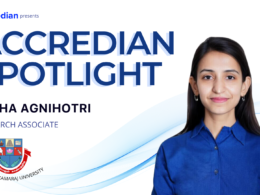At Accredian, we create accomplished and empowered Data Leaders. We groom our students to dominate the world of Data Science and AI and reshape their future. We value what our students bring to the table. We share their vision and support them during their journey and ensure that they carve a niche for themselves.
We’re proud to have tutored exceptional students all across India. Today, one such exceptional student, Ganesh Kumar B stands in the spotlight.
Student Name: Ganesh Kumar B
Current Organization: Topcoder
Batch: GCDAI – August 2019
Total years of experience: 19 years
Malvika: Hi Ganesh, before we begin, could you tell us more about your current work profile?
Ganesh: Currently, I am a Senior Architect at Wipro Technologies. I’m responsible for software delivery for the various customer accounts through a new delivery model called crowdsourcing.
I have done my Masters in Computer Science Engineering immediately after my Bachelor’s in Electrical and Electronics Engineering.
I’ve been working with multiple verticals like automotive, utilities, healthcare and supply chain. Being in the Technical Manager role helped me to elevate as a strong Enterprise Architect with strong domain knowledge in various verticals. My quick learning as well as an energetic skill has become a Digital Transformation Leader for various customers across multiple verticals.
Malvika: What got you interested in Data Science & Machine Learning?
Ganesh: I’m very much passionate about engineering.
At the time, I was also pursuing my PhD, and researching the automotive area to replace the commercial control system into an indulgent control system using Fuzzy logic- neural networks.
This gave me the excitement for the field because when I needed to demonstrate the Fuzzy logic- neural networks’ capabilities, I needed to work with data.
So I collected a lot of data and that data help me to validate my models and to demonstrate my results. So with that result, I was able to publish two papers in the IEEE and present it to a conference. That really helped me to develop a passion for Data Science and Machine Learning.
Malvika: What all tools and packages in Data Science & Machine Learning have you mastered in your Data Science & AI program at Accredian so far?
Ganesh: There are many tools and libraries available.
I worked fundamentally on NumPy and Pandas. Pandas is a very good tool and it helped me collate the various data sources like Excel. Along with collating data from various data sources, and then derive the insight from that using the existing libraries.
It was very useful to master Pandas and in-depth writing of codes with the help of the Pandas library.
Coming to Machine Learning, a lot of algorithms are there for one to explore.
I’m very much comfortable with Decision Tree which I’m still exploring because I was doing my research for Fuzzy logic- neural networks.
Malvika: What are some of the initial challenges you faced when you got started on your Data Science journey and how did you overcome it?
Ganesh: So as I mentioned, I started with Data Science as part of my research PhD and I had very limited knowledge and limited exposure to algorithms.
So I had a lot of queries. I knew about my area and was very comfortable in that but I didn’t know the other areas, so I did not have a lot of confidence.
I was struggling with how to articulate the benefits to the stakeholders. I read a lot of articles but that was not giving me a lot of confidence. I also tried to really put my hands into the programming area but the moment I joined the Accredian program that helped me a lot to develop confidence and understand how to articulate and how to do a modern evaluation. Those techniques really gave me confidence and now I can articulate to my customers or wherever I go, comparison of the various algorithms and that kind of support I found at Accredian.
Malvika: What is the goal of Data Science and how has the field evolved in the past few years?
Ganesh: For me, Data Science is split into two things.
What is science? There are two aspects to this. First, it is a natural explanation for humans of what happened in the world. That’s one way of looking at the goal of Data Science.
The second way is to predict the future. So that’s the science side of this which involves doing things in a structured way such that we are getting the information and putting it in an analytical way.
That’s the goal of science, but when you add data to that, it becomes a Data Science. Basically, Data Science should be able to provide an explanation of what happened in the past, and should be able to predict the events or predict based on data.
This is organized or structured data. This was how Data Science is defined. When it comes to the goal of Data Science, it should provide solutions to everyone in the world, from layman to experts.
People need to understand how their finances would look like, how their health will evolve, what kind of savings they need and of course, to solve a problem for the enterprise giants and universities in their business strategies and helping research and development. So that’s the goal; it should be reachable to everyone in the world.
Malvika: What are the current trends in Data Science that you are most excited about?
Ganesh: The entire world of Data Science is currently working towards building predictions to solve problems.
The entire industry is working towards bringing the smartness and intelligence of humans to things like prescriptive analytics or prediction based solutions.
So for example, if we take a smart home or a smart building or a smart car/autonomous car, how they’re working on it, they are bringing the precision or prediction to these solutions. If there is no one in a smart home, a prediction will be made and lights can be switched off to save energy. So this kind of a solution they’re bringing and those are the trends currently going on in the industry like preventive maintenance.
Malvika: At Accredian, students are encouraged to build high-quality GitHub profiles. Have you built a GitHub portfolio and how do you think this will help you?
Ganesh: This is a good session conducted by Accredian and the importance given to GitHub is very essential.
All the companies looking for people to hire can really get to see how you got your hands dirty and what is actually uploaded on your GitHub profiles. I really appreciate the initiative and the way we have to build our profile was amazingly explained by the team.
Although I’ve been in the industry for long and worked on many repositories like GitHub and GitLab day-in and day-out yet I didn’t know how to really present them in the right way. So the session really helped me to do that.
Malvika: Crafting a great Data Science resume is a critical part of getting shortlisted for Data Science roles. Tell us some ways in which you have improved your resume as part of Data Science Career Launchpad.
Ganesh: I’ve been in the industry for a long time and through the Career Launchpad, I got different perspectives altogether.
The way the Accredian Team guided us on how to build a striking resume and the summary was immensely helpful. I used to have a resume of more than five to six pages. This session really helped me to reduce my resume to three pages.
Malvika: Accredian’s mission is to groom Data Leaders of tomorrow, what do you understand by a Data Leader? And how do you think a Data Leader is different from a Data Scientist?
Ganesh: Data Scientists will help us derive insights and will articulate the insights in a detailed way.
But as a Data Leader, we’re to go beyond that insight and deliver the right strategy for an enterprise where we orchestrate the data or the insight in a bit to make the right decision for the future.
Malvika: What is your advice to anyone wanting to start a career in Data Science?
Ganesh: Being in the digital era, soon everyone will have to have the knowledge of Data Science.
Novices should not have any fear. First of all, they should be open to learning Data Science on a day-to-day basis in a structured and systematic way.
That should be the first step they have to keep in their mindset. The second step is to be able to distinguish between various algorithms or question their approaches and choice of algorithms.
Malvika: Thank you for your time, Ganesh. All the best for your future!





